Chris Whitty, Chief Medical Officer, has issued a warning
Air pollution wreaks havoc on nearly every organ in the body, and it’s expected to be linked to a staggering 30,000 deaths in the UK come 2025, a chilling report by leading medics warns. The Royal College of Physicians (RCP) has sounded the alarm that “no safe level” of air pollutants exists, highlighting the grim reality that roughly 99% of Brits are inhaling “toxic air”.
The startling insight reveals that exposure to this invisible killer could take off an average of 1.8 years from a person’s life. Throwing fresh light on a decade’s worth of evidence, the experts say that even seemingly benign low levels of pollution can adversely affect unborn babies and contribute to diseases ranging from cancer to mental health conditions and dementia.
And there’s more than just years lost. The toxic toll comes at a crippling economic cost too. Healthcare expenses and lost productivity due to foul air hit the exchequer for £27 billion each year, a number that could rocket to £50 billion if dementia and other broader effects are taken into account.
READ MORE: Cancer patient says don’t ‘ignore’ four symptoms that led to stage 4 diagnosisREAD MORE: PIP cuts mean people with these 3 health conditions could be ‘most affected’
Taking a stand, the College is pressing the Government for bold measures to clear the air, urging officials to put air pollution squarely on the radar as a critical health crisis. Lending his weight to the dire findings, England’s Chief Medical Officer Sir Chris Whitty said in the report’s foreword: “Air pollution remains the most important environmental threat to health, with impacts throughout the life course.
“It is an area of health where the UK has made substantial progress in the last three decades with concentrations of many of the main pollutants falling rapidly, but it remains a major cause of chronic ill health as well as premature mortality. Further progress in outdoor air pollution will occur if we decide to make it, but will not happen without practical and achievable changes to heating, transport and industry in particular.
“Air pollution affects everybody, and is everybody’s business.”
Dr Mumtaz Patel, president of the Royal College of Physicians, said: “Air pollution can no longer be seen as just an environmental issue – it’s a public health crisis. “We are losing tens of thousands of lives every year to something that is mostly preventable and the financial cost is a price we simply cannot afford to keep paying.
“We wouldn’t accept 30,000 preventable deaths from any other cause. We need to treat clean air with the same seriousness we treat clean water or safe food. It is a basic human right – and a vital investment in our economic future.”
It comes as Asthma and Lung UK called for tougher clean air laws. Air pollution has triggered potentially life-threatening asthma attacks and severe flare-ups of illness one in five people with lung conditions, according to a new poll by the charity.
More than half of 8,000 UK patients with lung conditions said air pollution had left them feeling breathless, according to the survey. Charity chief executive Sarah Sleet has branded air pollution a “public health emergency”. She added: “It is the biggest environmental threat to human health. For the millions living with asthma or chronic obstructive pulmonary disease (COPD), air pollution can be deadly, yet many people are unaware of the toll it has on the nation’s health.
“Toxic air is a major driver of respiratory conditions and can cause lung cancer and trigger asthma attacks, as well as flare ups of lung conditions such as COPD, exacerbating symptoms such as breathlessness, wheezing and coughing.
“Despite the huge personal and financial costs of air pollution, the government has not yet shown the political will to tackle this crisis.”
On Thursday over 100 doctors, nurses, patients and activists will meet at Great Ormond Street Hospital for Children in London and walk to Downing Street to deliver a letter calling for Government to commit to “ambitious” air quality targets. And one expert from Southampton warned that the nation could be walking into a “microplastics-style crisis”.
Dr Thom Daniels expressed his concerns, as he said: “While outdoor air pollution is widely recognised and understood, the dangers of indoor air pollution remain largely overlooked – and I worry we’re sleepwalking into another microplastics-style crisis if we don’t act now.”
Next month a cross-party group of MPs said they will reintroduce a bill, named after nine-year-old schoolgirl who died from an asthma attack linked to air pollution, which aims to make clean air a human right under UK law. Dubbed “Ella’s Law”, the proposed legislation is named after Ella Adoo-Kissi-Debrah, who lived 82ft from the busy South Circular Road in Lewisham and suffered the fatal asthma attack in February 2013.
She became the first person to have air pollution listed as a cause of death following a landmark inquest in 2020. A Government spokesperson said: “Air pollution is a public health issue, and we are committed to tackling this issue across the country.
“We have already provided £575 million to support local authorities to improve air quality and are developing a series of interventions to reduce emissions so that everyone’s exposure to air pollution is reduced.”

